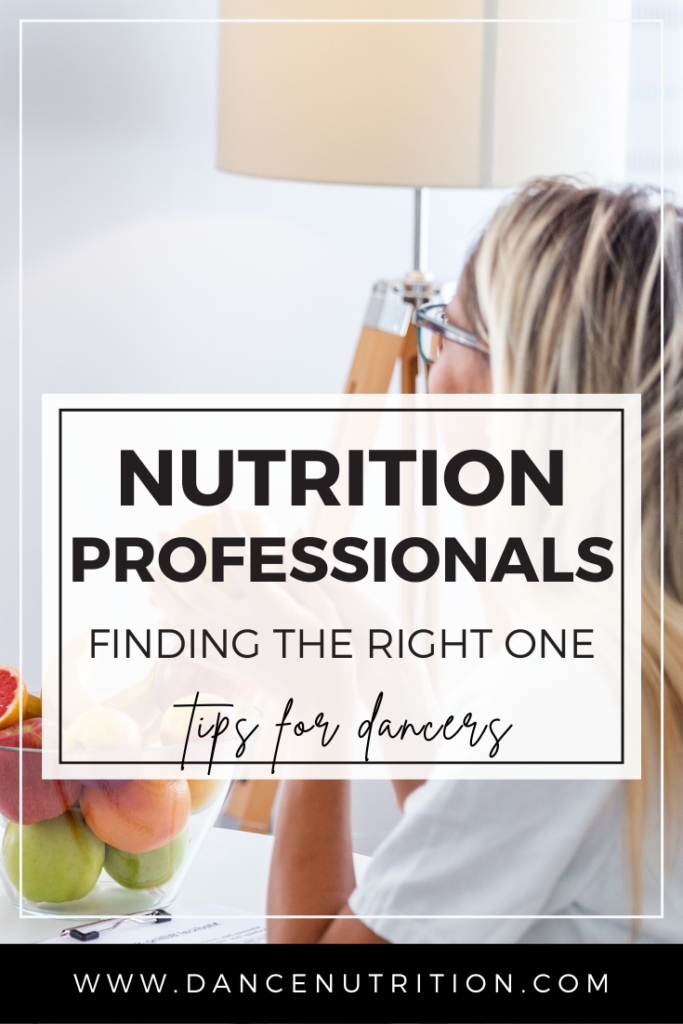For dancers, relying on a nutrition professional can be invaluable. From performance optimization to supporting your relationship with food, it’s no secret that good nutrition education is paramount. However, finding the right practitioner requires careful consideration. In this blog post, dancers can uncover what is most important when seeking a nutrition professional.
#1: Understand Your Needs As A Dancer
Recognizing your nutritional needs isn’t always easy— especially when inundated with messages encouraging impractical food and body ideals. How food impacts a dancer’s capabilities is just one piece of the puzzle. For many dancers, a nutrition professional constructs interventions that support a range of goals beyond food, including:
- Optimal caloric intake to fuel schedules packed with performances and rehearsals.
- Proper hydration to prevent cramps and maintain clarity.
- Meal planning strategies for long studio days.
- Injury prevention tools.
- Recovery nutrition for muscle and tissue repair.
- Body composition shifts.
- Body image healing.
#2: Identify Qualifications and Credentials
When selecting a nutrition professional, qualifications are paramount. Start with licensure. A Registered Dietitian (RD), Registered Dietitian Nutritionist (RDN), or Licensed Dietitian ensures your clinician has met the rigorous educational and professional standards needed to achieve higher learning in nutrition and dietetics. This typically involves 4+ years of academic training and another 2+ years of clinical training. In addition to this is the ethical obligation for evidence-based practices— in other words, advice is supported by the latest nutrition science and research. To learn more about the educational path of a dietitian, click here.
As a bonus, identify advanced qualifications. These certifications allow licensed nutritionists to focus their skills on the needs of a specialized population (like dancers). Interventions become more tailored with a deeper understanding and rationale behind each recommendation. Examples include:
- Certified Specialist in Sports Dietetics (CSSD): This certification indicates specialized training in sports nutrition, beneficial for understanding the needs of dancers.
- Certified Eating Disorder Specialist (CEDS): This certification indicates specialized training in eating disorders and disordered eating, common challenges that many dancers experience.
#3: Evaluate Experience and Relatability
A nutrition professional with dance experience helps to build trust and establish a good rapport with their clients. The right professional should recognize the unique psychological pressures dancers face, allowing them to address issues like body image and disordered eating, empathetically. A clinician with first-hand experience can relate to a dancer’s situation and offer more approachable guidance during sessions.
#4: Inquire About A Personalized Approach
Look for a professional offering personalized coaching opportunities. These sessions will be important in building interventions that fit your lifestyle, budget, and schedule. In my work with dancers, I utilize a holistic approach that considers all aspects of your well-being— crafting nutrition interventions that support not just performance, but also, good sleep patterns, stress management, and cross-training routines. In addition, the time is taken to evaluate a dancer’s medical history, past and current relationship with food, and body image.
#5: Identify Their Network and Resources
To provide comprehensive care, the right nutrition professional stays within their lane and connects you with a broader network to navigate other related, but different challenges. This may include health professionals like sports medicine doctors, physiotherapists, physical therapists, and mental health practitioners. Fitness trainers are also encouraged to support sustainable cross-training goals.
A network of referrals is just the start. Look for a nutrition professional who can provide resources like workshops, seminars, and other educational materials to enhance your understanding of dancer nutrition. The advice given should be practical and sustainable. As a dietitian for dancers, I encourage potential clients to first access my resources (videos, courses, downloads, etc.) to familiarize themselves with my work and approach.
Key Takeaways
Choosing the right nutrition professional is critical for dancers to enhance their performance and maintain a supportive relationship with food and body. By considering qualifications, experience, approach, and the ability to provide personalized, evidence-based, and sustainable advice, dancers can find a practitioner who supports their unique needs and goals. The Healthy Dancer® can be one such way to get started. Click here to learn more.



